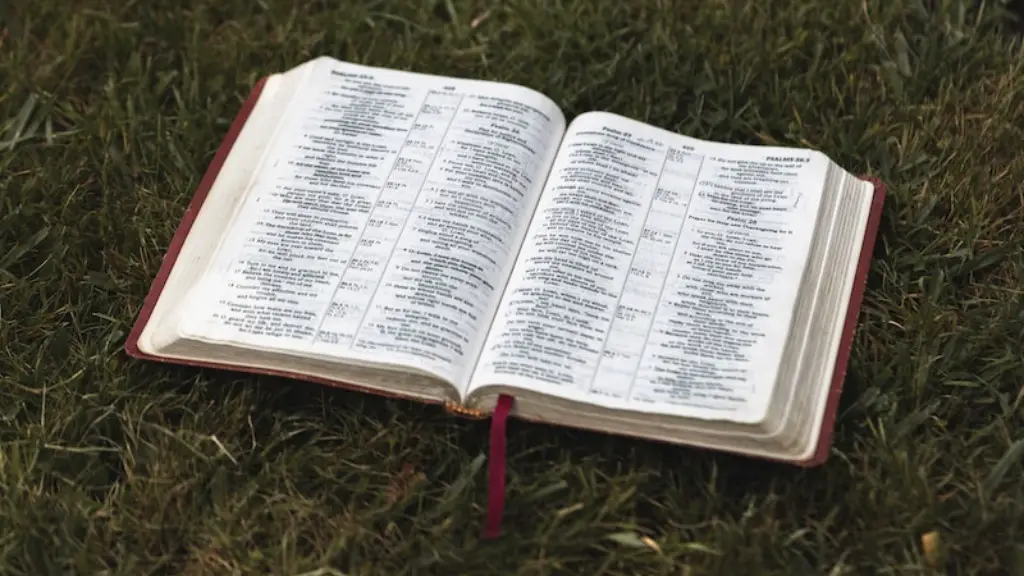The idea of blessing is pervasive throughout the Bible. It’s a powerful concept that speaks to the essential nature of people’s relationships with one another, their environments, and their God. It’s been widely studied by theologians and philosophers, and its relevance has even been incorporated into other belief systems.
The bible offers numerous definitions for the term ‘blessing’, such as ‘a divine favor or benefit’. It sees blessing as something that comes from God – both in the form of physical goods and non-tangible values, such as the inner peace and emotional security that come from faith. In Christianity specifically, the idea emphasises that while people are separated from God in some way, they still have a special loving relationship with their Maker that transcends earthly matters.
This concept is explored in multiple places in the Bible. In the Old Testament, God gave blessings to certain people – including Abraham and his descendants – as a sign of eternal favor. Meanwhile, in the New Testament, Jesus is seen as a bringer of divine grace and blessing – saying the words ‘Go in peace, be blessed’ when talking to his disciples. And this sense of divine favor is echoed in Jesus’ well-known beatitudes, which state that ‘Blessed are the peacemakers…’
For many Christians, much of a blessing’s power comes from its connection to thanksgiving. When people give thanks, even in difficult circumstances, they are connecting with a higher power that could provide hope and strength. This can be seen as a form of blessing. When faced with a challenge, giving thanks to God can remind you of your spiritual connection to something much larger than yourself, and this can serve as a saving grace.
The blessing is also seen as a sign of humility, recognising our place within the divine. It is not only a way to give thanks but also a recognition that we have not earned the favor of God – it is a gift, an invitation into a loving relationship. An authentic blessing in the Bible is a request that God strengthens us in our efforts, purpose, and relationships.
In today’s fast-paced world, it’s easy to forget about the power of blessing. But, by remembering, it can provide us a glimpse of hope in a world of constant chaos. It’s a reminder to be grateful for all that we have, no matter how small the blessings may be. It’s also a call to open our hearts and minds to the divine, and to embrace the grace that comes with it.
The Relationship between Blessing and Doing Good Deeds
The relationship between blessing and doing good deeds is particularly meaningful in Christian theology. As the bible teaches, it is only through good works that we can reach out and receive God’s grace. The idea of blessing thus includes not only thanksgiving formed by gratefulness, but also an action component that is the result of good works.
The bible speaks of those who receive blessings in context of doing good deeds and serves as an example for how people should behave. Leadership roles often serve as a model for this – for example, in the parable of the talents Jesus speaks of the blessed person being ‘good and faithful servants’. Jesus also speaks of the ultimate blessing of eternal life being given to those who put their faith in him and lead a life of service.
These examples and teachings give an idea of the power that is released through blessing. Through blessing we can step into a higher form of operation – as if we are being propelled by grace and mercy, even when doing difficult things. Blessing is an active form of faith, an invitation to use our time and resources to do good, and embrace the love and favour of God.
The Golden Rule and Blessing
The golden rule plays a key role in blessing. It states: “Do unto others as you would have them do unto you”. The idea behind this phrase is that we should extend the same kindness and love to others, that we would want for ourselves. This attitude can help people to respond with compassion and understanding, even in difficult circumstances. It also carries a sense of divine grace – that when we choose to bless others, we are likely to receive the same in return.
In the Christian faith, the Bible speaks of how Jesus taught the golden rule. The sermon of the mount in Matthew 5:7-10 is full of examples of loving one’s neighbor as oneself. It speaks of honoring one’s parents and not bearing false witness; of being gentle and humble, of not seeking revenge, and of loving our enemies. All of these examples of love and good deeds can be seen as a form of blessing.
In the modern world, the golden rule still applies. We should treat others with respect and empathy, and seek mutual understanding. We should welcome those of different backgrounds and beliefs, and recognize the achievements of others. In so doing, we are engaging in blessing, extending grace to those around us and in turn, we invite divine favor into our lives.
The Blessing of Forgiveness
When it comes to blessing, the theme of forgiveness is key. According to scripture, Jesus taught us a great deal about this, emphasizing the importance of seeking and granting forgiveness. In the Bible’s teachings, blessing can be seen as a form of releasing and letting go. People are encouraged to seek the opportunity to reconcile and embrace love, rather than the need for retribution or resolution of anger or hurt.
The greatest example of this is Jesus forgiving those who put him onto the cross – even when facing his own suffering and death. This is an extreme example of blessing, and an invitation to each of us to practice this same kind of forgiveness in our own lives. Regardless of what has come before, we can have faith that, with openness to blessing, hope and redemption are possible.
The message of the Bible is ultimately one of hope, and central to this is the blessing that comes from God. Like any real friendship, it takes time and effort to fully understand, appreciate and accept a blessing. But it’s worth it, because God promises that with love and faith, we open ourselves up to ways that go beyond our own understanding.
The Blessing of Prayer
Prayer is an important aspect of blessing in the Bible. It is seen as an act of communion between God and people, providing us with an avenue for offering thanks and showing humility. The Bible speaks of the importance of prayer for developing a meaningful relationship with God – it’s an opportunity to express our love and gratitude for all that we have been blessed with.
Although prayer can come in many forms, some aspects are especially highlighted in the Bible – such as confession and supplication. Confession involves reflecting on our shortcomings and seeking forgiveness, while supplication is when we offer thanks and ask for additional blessings. Together, they provide us with an opportunity to actively deepen our connection to the divine.
The Bible also speaks of spiritual devotion, the idea that in our prayers we can access the divine. We’re urged to trust in God and embrace the hope that brings – engaging in deep reflection and prayer to receive divine guidance and strength. For many, this can be a powerful source of connection to God, allowing us to experience the blessing that serves as a reminder of our faith and purpose.
Blessing and Hope in Action
Ultimately, the concept of blessing in the Bible provides us with a way of finding hope even in the midst of difficult times. We can turn to blessing to find a connection with something greater than ourselves, as well as a reminder of our place within the divine. We can walk into our lives with acceptance and humility, using our faith to continue striving towards our goals with grace and love.
The bible urges people to show kindness, to share love and grace, and to be humble – all of which can help to spread the blessing from God. By taking action, even in small ways, we can create a world where people look out for one another, seeking reconciliation and understanding. This is the foundation of blessing and of God’s promises, an ever-present source of hope for a better future.





